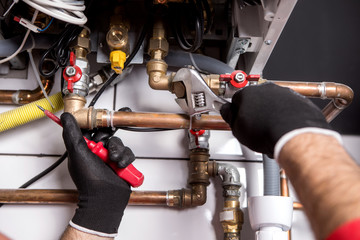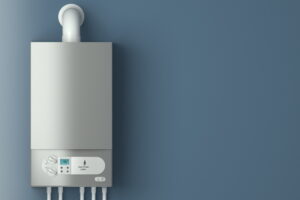Don’t ever run out of hot water again! Denver Tankless Water Heater heats water on demand and can save energy by only using energy when needed.
These water heaters can be sized by measuring your desired temperature rise minus your groundwater temperature and the flow rate of all faucets and showerheads. These units are available in either gas or electric.
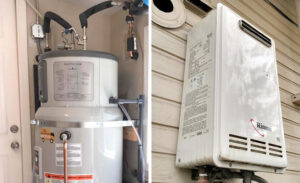
A Tankless Water Heater is a long-term investment in your home that saves money on energy bills and improves your home’s efficiency. However, these units are more expensive than storage tanks and require specialized installation to ensure that you get the most out of your new system.
Installation costs can add $500 to $3000 to the total cost of your project. You’ll also need to factor in the cost of piping, gas and electrical venting, as well as any needed changes to your home’s plumbing. For example, if your tankless system will replace an existing gas-powered unit, you’ll need to install new exhaust systems and gas lines. Electric models are cheaper to install than gas, but they still require a dedicated electrical outlet and may need an upgrade to your electrical panel. You’ll also need to decide between a condensing or non-condensing unit; the former offers greater energy savings by recapping and using the exhaust heat, but it’s also more expensive.
The size and capacity of your unit will also impact its price. Larger units with a higher gallon-per-minute (GPM) flow rate can support more fixtures at once, but they’re typically more expensive. For example, a small one-bedroom house can usually use a two to three GPM unit, while larger homes need units with up to 10 GPM.
Another cost to consider is the recirculation pump, which can cut down on the wait time for hot water by keeping it circulating in your pipes. This feature is particularly useful when you’re installing your tankless system in a home with longer distances between the heater and fixtures. The pump can be activated by a timer, a button, a motion sensor or a smart device.
When compared to traditional tank water heaters, a Tankless Water Heater uses much less energy. In fact, it’s one of the most energy efficient appliances in a household, saving homeowners over $50 per year in energy costs. While they cost more at the onset, this investment pays for itself with long-term savings.
The type of tankless water heater that is right for you will depend on your peak hot water demand. This is a combination of the number and flow rate of your sinks, showers, and washing machines. The best way to determine your peak hot water demand is to add up the number of people in your household, their daily activities, and the temperature rise required by each fixture (hot showers and laundry). This will give you a good idea of how much energy your house needs at its busiest times.
If your home is based on natural gas or propane, a gas tankless water heater will be more economical than an electric model, which is cheaper to purchase but not as energy efficient. However, the differences between these two models will also depend on your local fuel prices and your house’s energy efficiency.
If you’re looking for even more energy efficiency, a recirculation pump can be used to move hot water more quickly throughout your house, reducing the amount of time needed to warm it up. However, this system can become expensive if your plumbing isn’t already set up for it, or if you don’t want to spend the money on a new water heater and plumbing upgrades.
The Energy Star website states that families who switch to tankless water heaters can save hundreds of dollars a year on their energy bills. However, these savings are only realized if the unit is properly sized for your household and properly maintained. If the tankless water heater is too small, it can fail to meet your household’s hot water demands, causing an overload of demand on the system. It can also be a fire hazard if the hot water ducts are blocked and prevent the heater from venting properly.
A Tankless Water Heater can provide endless hot water as long as there is fuel or electricity to power it. This eliminates the need for a storage tank, which can be limited by its size (as you’ll discover when all your kids shower before you and use up all of the hot water!).
It takes time for a demand-type tankless water heater to heat water. This is because it only heats water on demand, as opposed to heating a constant stream of hot water from the tank. This can lead to a delay in the flow of hot water to your faucets, especially if you’re using multiple hot water appliances simultaneously.
If you’re concerned about the amount of time it takes for your Tankless Water Heater to produce enough hot water, choose a model that includes a built-in flow sensor and a modulating gas valve. These features will ensure that your Tankless Water Heater will meet your household’s hot water needs and prevent it from over-heating and causing a fire hazard. Also, a professional installation will ensure that your demand-type water heater is sized correctly for your house and meets local codes.
Power outages are a common problem for many households, and they can leave you without any hot water. While Tankless Water Heaters are known for their energy efficiency, they still need electricity to function properly. So, if you lose power during a storm or a blackout, your water heater won’t be able to operate.
The reason for this is that the gas tankless water heater needs electricity to power the fan that moves exhaust gases out of your home produced by the combustion of natural or propane gas. If you’re in an area prone to power outages, you can purchase a battery backup system that will allow your heater to operate when the power goes out.
There are also power generators that can be used to provide emergency electricity for your appliances. These units are quiet and produce a pure sine wave that doesn’t cause surges to your appliances or water heater. However, these aren’t as affordable as a tankless water heater.
For homeowners that want a solution that is both cost-effective and reliable, they should consider purchasing a gas-powered generator. These generators will provide your household with enough electricity to run your water heater, as well as other household appliances and mechanicals.
Once the power comes back on, you’ll need to reset your electric tankless water heater by pushing the breaker to the “On” position. If you notice any strange noises, or the water heater isn’t heating up your water, it may need professional attention. Contact us for a tankless water heater installation or repair in
Unlike a traditional water heater that can be used for up to 12 years, tankless water heaters can last as long as 20 years or more. However, it is important to remember that a tankless water heater needs to be maintained and properly cared for in order to continue to function well.
One of the most important maintenance tasks for your tankless water heater is to clean its burner chamber, circulating air passages, and control compartments. This can be a dangerous task to attempt on your own because you will need to work with gas components, so it is best left to a licensed plumber.
Another critical maintenance task for your tankless water heater is to flush the system on a regular basis. This will remove mineral deposits that can build up over time and reduce efficiency or cause damage to your system. To flush your tankless water heater, shut off the water supply and power, then open the drain valve on the bottom of the unit. After the water has completely drained, connect a descaling solution to the cold water inlet valve, and follow the manufacturer’s instructions.
Lastly, it is also a good idea to periodically wipe down the exterior of your tankless water heater. This will help to keep dust and dirt from accumulating, which can also contribute to damage or reduce the function of your system. Performing these simple maintenance tasks will ensure that your tankless water heater continues to provide you with hot water for years to come.

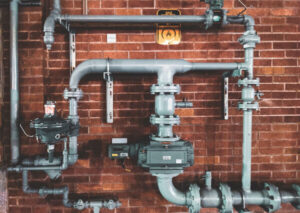
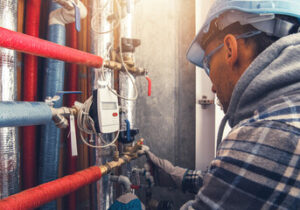 Many people find plumbers through word-of-mouth referrals from family and friends. Having a good reputation is an important factor when choosing a plumber. If a plumber is known for doing quality work at a fair price, they will often get repeat business from satisfied customers. On the other hand, plumbers with a poor reputation for cutting corners and ripping off customers will usually need help finding new clients.
Many people find plumbers through word-of-mouth referrals from family and friends. Having a good reputation is an important factor when choosing a plumber. If a plumber is known for doing quality work at a fair price, they will often get repeat business from satisfied customers. On the other hand, plumbers with a poor reputation for cutting corners and ripping off customers will usually need help finding new clients.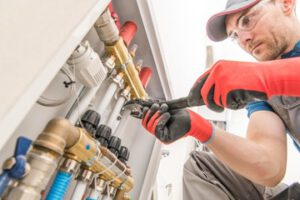 An expert plumber is a professional with extensive training and the qualifications to handle any plumbing issue. These professionals have a deep understanding of the mechanics and physics of plumbing systems and can quickly diagnose and fix any problems that may arise. They have the knowledge and tools required to repair leaks, install new pipes, and maintain the overall health of a plumbing system.
An expert plumber is a professional with extensive training and the qualifications to handle any plumbing issue. These professionals have a deep understanding of the mechanics and physics of plumbing systems and can quickly diagnose and fix any problems that may arise. They have the knowledge and tools required to repair leaks, install new pipes, and maintain the overall health of a plumbing system. Sagging roofs can be a real threat. They can cause structural damage and even collapse. This can be a very dangerous and costly situation. You can get a professional to inspect your home for signs of sagging. However, you might want to check for a few signs yourself first. The best way to identify a sagging roof is to look for a sagging area on the flat portion of the roof. Look for areas with a dip, bowing, or humps. If you notice these, then you may have a sagging problem.
Sagging roofs can be a real threat. They can cause structural damage and even collapse. This can be a very dangerous and costly situation. You can get a professional to inspect your home for signs of sagging. However, you might want to check for a few signs yourself first. The best way to identify a sagging roof is to look for a sagging area on the flat portion of the roof. Look for areas with a dip, bowing, or humps. If you notice these, then you may have a sagging problem.
